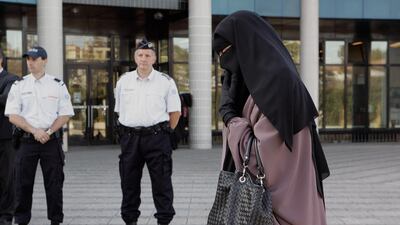The UN Human Rights Committee on Tuesday criticised France's so-called burqa ban, saying the law "violated" the rights of two women who were fined for wearing full-face veils in public.
The committee called for the women to be compensated and for a review of the 2010 law that forbids people from publicly wearing clothing that conceals their face.
"The French law disproportionately harmed the petitioners' right to manifest their religious beliefs," the committee said.
It added that it was not convinced by France's claim that the ban was necessary for security and social reasons.
The two French women were convicted in 2012 for wearing the niqab, a veil with an opening for the eyes.
"The ban, rather than protecting fully veiled women, could have the opposite effect of confining them to their homes, impeding their access to public services and marginalising them," the committee said.
The UN Human Rights Committee, made up of independent experts, ensures countries stick to their human rights commitments but it does not have enforcement powers.
It said the French ban was "too sweeping" but that governments could still make people show their faces in specific circumstances.
_____________
Read more:
Muslim couple denied Swiss citizenship over handshake refusal
Denmark bans burqa in public spaces
_____________
The committee's decision reignites a debate that has raged in France for years over Muslim headwear and other religious clothing.
The debate has regularly pitted supporters of the country's secular constitution against those who argue for religious freedoms.
The 2010 law had strong public support when brought in under former president Nicolas Sarkozy. But many said it targeted the tiny minority of Muslim women in France who wear Islamic veils.
Condemned by critics for pandering to far-right voters but backed by many women rights activists, the law made France the first European country to ban garments that cover the face.
An estimated five million Muslims live in France and women who ignore the ban can be fined up to €150 (Dh629).
"The vast majority of cases where people have been stopped for checks and have been condemned to fines ... have been women wearing the niqab," committee member Ilze Brands-Kehris said.
"In the context of fewer than 2,000 women wearing the full-face veil in France ... [the law has] a vast disproportionate effect on those women."
Other EU countries, including Denmark, Austria and Belgium, have also introduced similar full-face veil bans.
"France violated the human rights of two women by fining them for wearing the niqab," the committee said, adding that measures should be taken to prevent similar violations in future, including a review of the law.
France, which has ratified UN rights treaties, is "under obligation" to comply with the committee's recommendations and act in good faith, Ms Brands-Kehris said.

